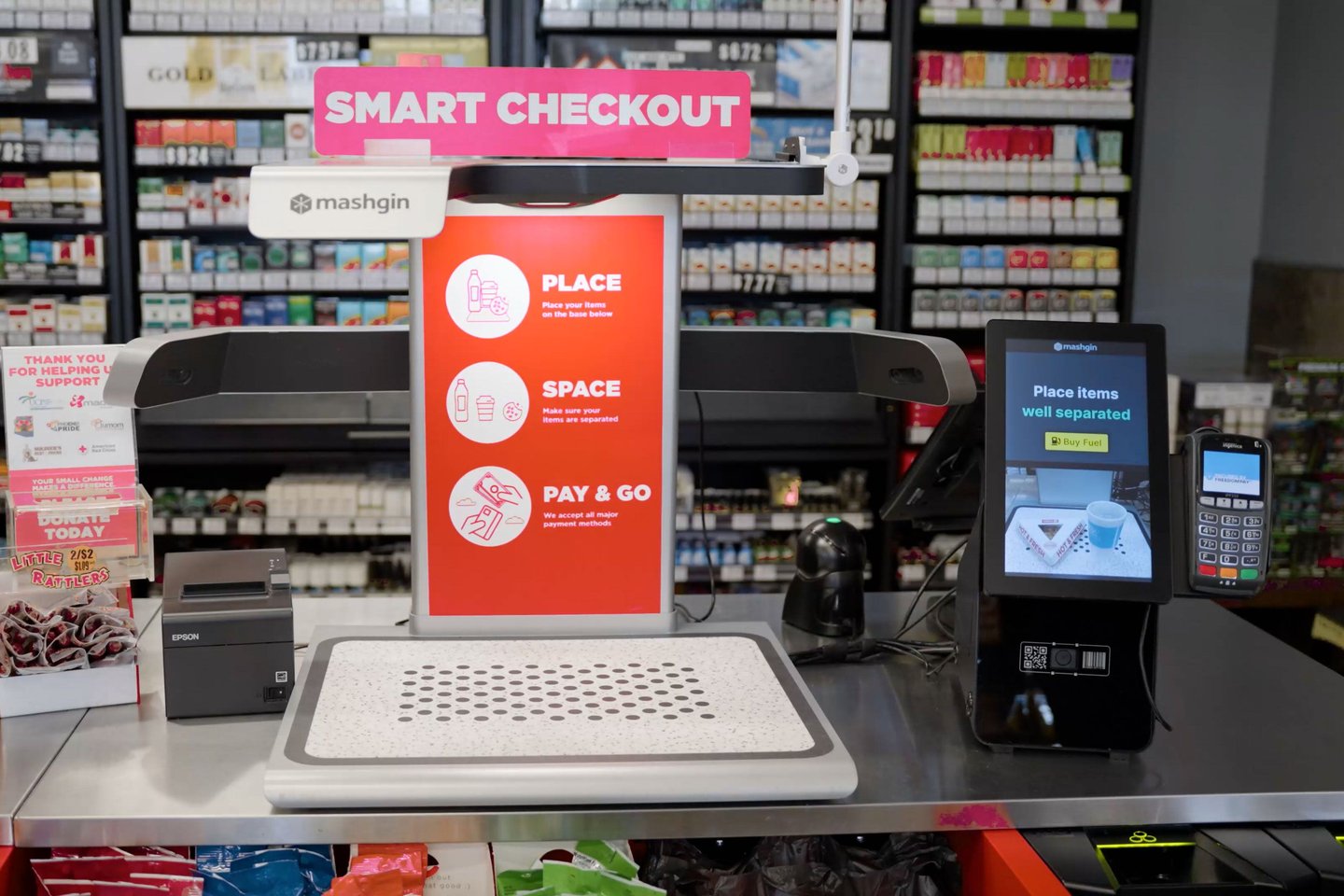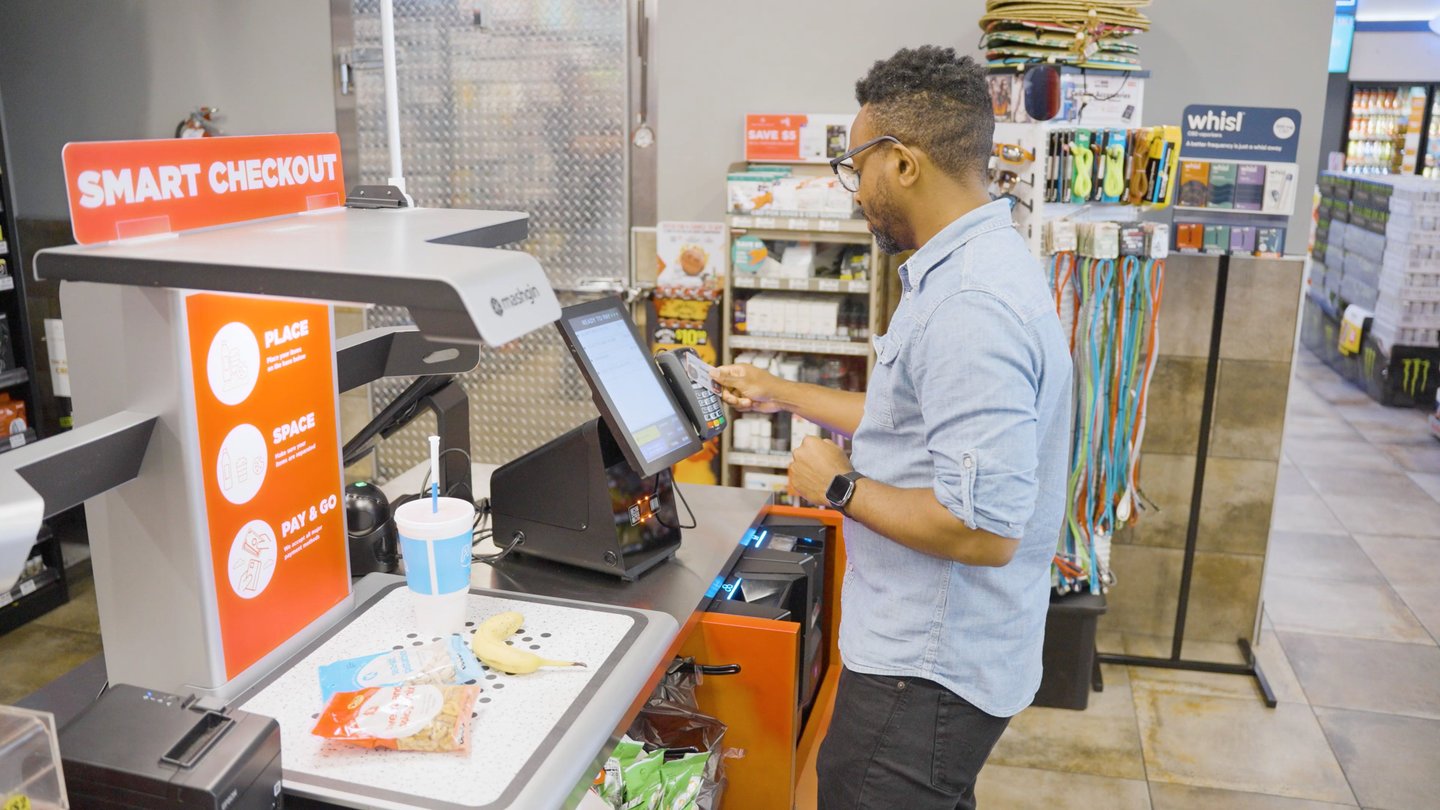Checkout technology
An innovation Couche-Tard tested in its store lab at McGill University in Montreal is being rolled out across the Laval, Que.-based company’s global footprint, after being a huge hit with the store’s mainly student body customer base.
In June, Couche-Tard announced it will deploy more than 10,000 Masghin touchless checkout systems—branded “Smart Checkout”—to more than 7,000 Circle K and Couche-Tard stores.
Jack Hogan, a senior vice-president at Palo Alto., Calif.-based Mashgin, says, “We will be in thousands of stores for them by the end of this year. The Canadian rollout is still being scheduled, but we’re looking to start in the latter part of the year.” In the next three years, all 7,000-plus (of its roughly 15,000 stores around the world) will have Smart Checkouts.
Using cameras and computer vision algorithms to recognize objects in 3-D, the system identifies every product placed on the scanner, ringing up the total in a blink of an eye. (Mashgin’s technology even distinguishes between different chocolate bar brands!)
The Masghin system had more customer adoption than expected in the lab, says Charles de Brabant, executive director of the Bensadoun School of Retail Management at McGill. “It removes the frustrations of having to scan item after item at the typical self-checkout in a grocery store, which can be annoying and slow down the process,” he says.
Couche-Tard says the system will improve customer checkout times by as much as 400%. (See sidebar for more insights from the Retail Innovation Lab.)
Problem-solving technology
This is just one of the many innovations, from touchless checkout offerings to cash automation technology and digital display advances, transforming and modernizing the c-store sector. The transformation is happening at all operation sizes, including regional chains and independents.
Gerry Bes, general manager of Little Short Stop Stores, which operates 30 convenience stores in southwestern Ontario, says tech that would eliminate the need for a customer to interact with a cashier is not on the table for its needs.
“One of the key differentiators of our stores is that customers are greeted, and our managers and team members often know what they want as soon as they walk through the door,’ says Bes. “We find the service experience is elevated because of the relationship we have with customers, which is not possible with self-checkout.”
In turn, the chain is most interested in tech that gives cashiers more face time with customers, not less. Enter the touchless cash machine from Glory Global Solution, which Little Short Stop Stores is bullish about after testing it in two locations. It invites customers paying by cash to insert their bills into the machine, which then dispenses their change.
The technology removes the need for the cashier to handle money, which research has shown to be crawling with bacteria. “It also allows our team members to keep their attention on the customer, giving them more time to interact and build on our customer service difference,” notes Bes.
Team members also don’t have to count the till at the end of their shift, which saves about 15 minutes, he adds.
In addition, Glory’s machine technology detects and rejects counterfeit bills, which Bes says is still a big problem.
“It is a great use of technology that ticks all the boxes. It creates a better customer service experience and also solves a lot of issues we have in our locations,” he says. “Given the time savings in the store, we have calculated a two-and-half-year payback on the technology.”
He would like to roll out the POS solution across the chain, however he wants first to see Glory’s software updates keep better pace with banknote changes.
Opportunities for independents
Rather than put off by the potential investment, Bes advises smaller chains to embrace technology that solves problems.
“If you have a lot of locations, it can help in terms of getting a better deal from the technology provider,” he notes. “However, I’ve found it is pretty amazing what tech people can do for even a one-off store. How do they do that cost-effectively? They aggregate the solution across multiple independents.”
A technology solution for smaller operators is also set to come from a surprising source.
Aisle 24, the company behind the cashierless c-store concept in Canada, is rolling out a product designed to help independents deal with the challenges of digitizing their operations.
“Our product roadmap includes creating a software package of our operation systems that we can then license to independents and smaller retailers, helping to bring them into the digital age,” says Aisle 24 co-founder John Douang. “We see a big opportunity for our business.”
The aim is to help independents with managing and pricing inventory, payment processing, mining customer data for insights, and app and digital media management.
“The software package we are working on is a complete end-to-end platform that will allow businesses to turn their standard operation into an ‘unmanned, cashier-less’ operation,” says Douang. “It will include security systems, AI analytics, in-store operational systems and a complete backend administration system.”
A hybrid solution
Aisle 24 is also partnering with a new franchisee in Newfoundland and Labrador on a hybrid concept store in Goose Bay, which is slated to open Q1/Q2 2023. It will be about three times the size of an average store (which is about 5,000 sq. ft.) and be staffed during high-traffic daytime hours, then available only to Aisle members in the late evenings and early mornings, when it is unstaffed.
“This will allow us to sell age-restricted products,” like tobacco and lottery, says Douang. If the concept works, it could become a model to roll out Aisle 24s in northern parts of Canada—and help those operators better compete.
These developments harken back to why Douang launched Aisle 24. His parents worked 14 hours a day almost every day at their own convenience store in Toronto, and with Aisle 24 Douang wanted to offer a franchise opportunity that would lessen the time constraints on c-store operators.
“One of the main reasons a lot of mom-and-pop stores are struggling is because they were not digital-ready. And then when the pandemic hit, they were unable to capitalize and fell even further behind,” he says. “We want to offer them the technology to help bridge the gap.”
A little friction isn't a bag thing
Findings from the Retail Innovation Lab at McGill
You would think a digital-savvy, young population would love a c-store experience in which they can just grab what they want and bolt out the door.
But given the option, they prefer a little bit of friction and/or human interaction, according to Charles de Brabant, executive director of the Bensadoun School of Retail Management at McGill in Montral. This conclusion is based on his observations at Couche Tard’s on-campus test lab.
While the store lab is currently undergoing a transition of technologies, it has been divided into two parts. One side of the store was specially designed to be frictionless and had no staff on duty. Called Connecté, it required users to unlock the door with an app. Once inside, they could pick up and walk out with what they wanted, the “purchased” products automatically processed for payment in the app.
The other side of the store had one Mashgin system and two cashiers. Despite largely young adults on campus, “a lot of them didn’t want to download the app" to shop on the Connecté side.
“Mashgin checkouts did so well because it made it easier for customers and saved them even more time since you don’t have to download an app and enter any payment information. They are non-threatening and very intuitive,” says de Brabant.
Let's get personal
Aisle 24 employs tech to create a tailored in-store experience
“We have learned pretty quickly that in an unmanned environment, the shopping experience can become very sterile and impersonal to shoppers,” says John Douang, co-founder of Aisle 24, which (last count) had 22 stores in Ontario and Quebec, and by the end of the year will open franchises in British Columbia, Alberta and Nova Scotia.
To that end, the cashierless convenience store chain is investing in frameworks to create a more personalized, tailored in-store experience.
This includes personalized messaging, including greetings when customers enter the store, as well as promotional messages based on their purchase history.
This will be delivered not only to their mobile devices, but also digital displays inside the store, including via Samsung Kiosks, which were recently added in select Aisle 24 locations.
The kiosks provide a payment system and streamline management tools on the backend, while providing promotional display opportunities.
“It can inform customers of timely offers and deals, as well as encourage last minute point-of-sale-purchases,” says Mary Peterson, VP, IT and enterprise solutions at Samsung Electronics Canada.
She says the kiosk also has a “built-in recommendation engine,” and can push out “timely offers that apply specifically to a customer’s purchase as they scan their products.” This can include discounts on additional items based on what is currently in their basket.
This “can increase overall sales for businesses and help to shift older inventory closer to sell-by-dates,” says Peterson.
-Originally published in the September/October 2022 issue of Convenience Store News




